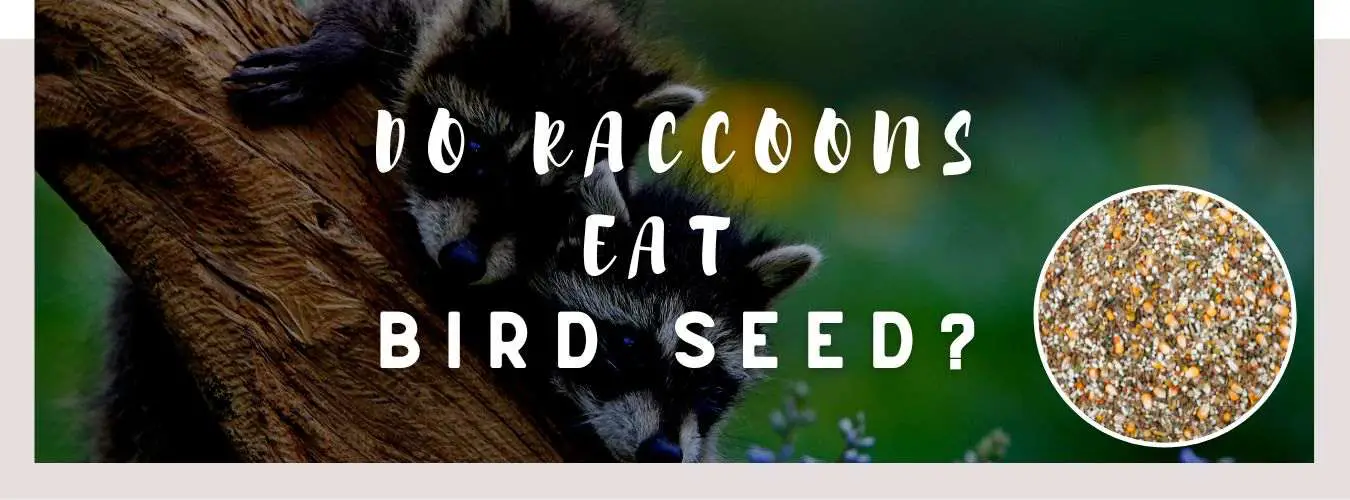
Besides using their fingers to inspect food, raccoons are also adept tree climbers and can raid bird houses of their seeds which makes them a nightmare for homeowners that have bird feeders in their backyards.
Here we discuss if raccoons eat bird seeds and how to prevent them from tampering with your bird feeders.
Do Raccoons Eat Bird Seeds?
Yes, they eat almost all kinds of bird seeds. Many homeowners who have bird feeders in their backyards are victims of this beastly theft.
Raccoons are scavengers who love easy food and are industrious when they find it.
Normally, they scavenge for food at night and are attracted by the bird seeds scattered on the ground. But after eating the bird seeds scattered on the ground under a tree, they will climb it and feast in the bird feeder.
This is usually a problem for homeowners who set up bird feeders in their backyards, especially during winter. So how can you deter raccoons from your bird feeder?
How to Deter Raccoons From Your Birdfeeder
There are several ways to ensure that raccoons avoid your backyard and bird feeders. The goal is to prevent them from eating your bird seeds, not to harm them.
Check out these repellent tips to keep raccoons away from your bird seeds.
You might also like: What Do Raccoons Eat In The Winter?
Mark the territory

Raccoons usually avoid territories where there is a likelihood of meeting a predator. The urine of natural predators makes them think that your backyard is unsafe for them to congregate.
So you can pour some urine of the common predators of raccoons, especially around their entry and exit points. But it would be best to use the urine of familiar predators in your area. A recognized scent will do a great job at deterring them.
You can buy this urine from a local pest control store. This is a win-win situation because the raccoons are not hurt, and your bird seeds are safe.
If you keep pets like dogs or cats, they may become confined to the house, thinking there is a predator marking their territory in the area. But you can try the other suggestions.
Use hot spices
You can mix hot spices like cayenne peppers in the bird seeds. You can also spray some around the bird feeder post.
Raccoons are very suspicious of food items and inspect them carefully before eating them. They are bound to become irritated by the heat of the spices.
Also, if they skip the inspection, the heat of the spices will surely teach them a lesson. But it will not harm them so you can be sure they will never come close to your birdfeeder again.
The major compound in chilies is capsaicin. It is not harmful. It only tricks the taste buds and the body into thinking that it is experiencing a burn. The effect usually wears off in a short time. It is a safe trick to deter raccoons from your birdfeeder.
The hot spices will not hurt your birds. Birds eat pepper seeds, and they are not affected by the heat.
You might also like: Do Raccoons Eat Grapes?
Move your bird feeder

One mistake many people make is to have their birdfeeder close to the fence, a tree, and other structures that offer support to raccoons and other pests.
You want the birdfeeder to stand isolated and far from any structure that raccoons can climb.
Remember that raccoons are adept climbers. Another thing you can do to frustrate raccoons’ efforts is coat the post with grease.
A great part of the raccoon brain is devoted to processing sensory signals from their hands. Their hands help them “see” an object without looking at it.
Having grease or any other sticky material on their hands impairs their ability to “see” with their hands.
So moving the bird feeder to a place where they are forced to climb the pole and coating the pole with grease or any other sticky oil is a great way to frustrate and keep them away from your birdfeeder.
Motion-Activated water sprinklers
Getting raccoons wet is another excellent way to keep them out of your yard and away from your bird feeders.
You can install a motion-activated sprinkler close to your birdfeeder, but it would be best to set it to night mode as raccoons are largely nocturnal animals.
Do not expect raccoons to stop visiting your yard after getting initially drenched. However, they will stop coming for your birdfeeder after getting repeatedly wet.
Why Choose Safe Repellent Devices and Methods
Use only harmless deterring methods to keep raccoons at bay. Although it is illegal to kill raccoons, humans have a moral obligation to protect the earth’s biodiversity, and raccoons are no exception.
Humans use more of the earth’s resources than any other animal and contribute the least.
So using harmless repellent devices should not be motivated by the laws prohibiting them but by the obligation to use the planet’s resources wisely and to protect the earth’s biodiversity.
Raccoons and many other small critters increase the oxygen supply by planting seeds as they go foraging. When raccoons eat fruits and leave the seeds on the ground, they grow into another oxygen-producing plant.
Raccoons also keep the population of smaller pests in check. This helps avoid pest infestation in homes and farms. As prey for other animals, they also ensure the continuity of many other animal populations.
So if you want to keep them out of your bird feeders, use harmless tactics.
Contents










